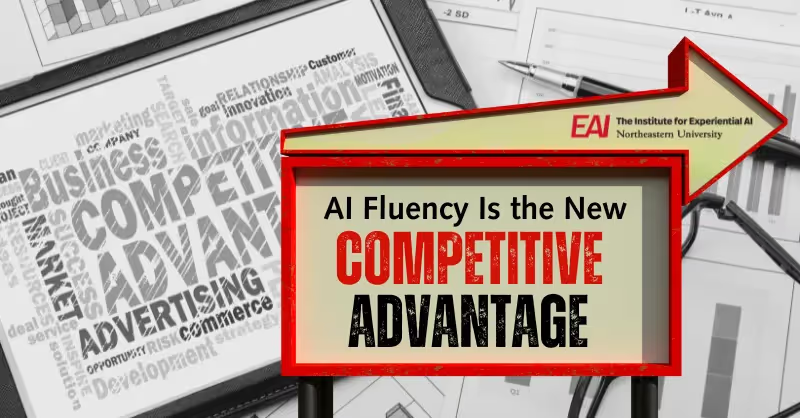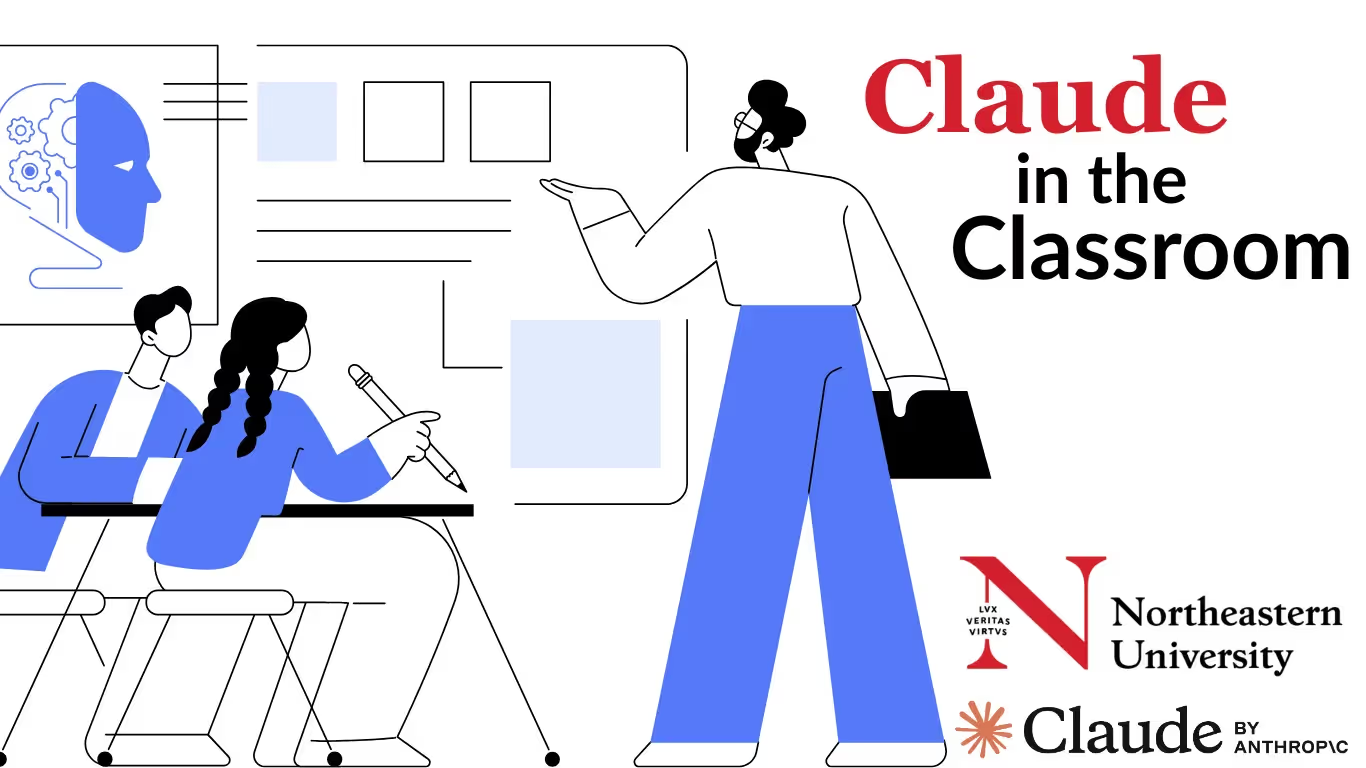AI and the Role of the University
.png)
In today's flurry of conversations around AI—its promises, challenges, and potential risks – many experts believe universities are best suited to provide a credible and honest assessment of the true impact of AI on education, business, and society.
In a recent article for The Chronicle of Higher Education, Northeastern University President Joseph E. Aoun touted the potential of universities to serve as "honest brokers" for AI’s future, crediting their multidisciplinary expertise, tradition of rigorous analysis, and ability to foster “robot-proof” skills.
“It is high time, then, to contemplate systematically what it means for humanity to exist in an AI-driven world,” Aoun told The Chronicle. “Such an accounting must do more than merely tally up the pros and cons of these new technologies. It should offer a roadmap for how we can maximize their positive aspects and minimize the negative ones for the benefit of humankind. To my mind, there is one societal institution that is ideally positioned to provide this kind of accounting: the university.”
With a mix of experiential learning programs, executive education, workforce development, and masterclasses in key topics like Responsible AI, Northeastern is the model for the future of AI education. Next month, we will host a workshop focused on AI education in health and life sciences, exploring new approaches to educating students, upskilling professionals, integrating AI into curricula, and more.
With the fall semester underway, we examine how Northeastern is leading in preparing businesses and students for an AI-driven world:

“It’s an old cliché that learning does not stop in the classroom. If AI is even a fraction as revolutionary as it is claimed to be, then this becomes an imperative. Professionals of all stripes need to learn about AI and its impact on their fields, students need to future-proof their learnings for an AI-driven future, and both need to leverage the technology to stay relevant in the new knowledge economy. For companies and organizations, there is another stark reality when it comes to upskilling their employees: There is so much demand for talent that is proficient with AI, that all the new graduates of all institutions of higher education combined will not be able to meet this demand, which leads to a new necessity: The only way to meet the demand is to turn more seriously to upskilling the existing workforce. This will become a mandate in this fast-developing landscape.”
Fayyad added, “Equally important is the potential for AI to assist in the learning process, expanding access to education through personalized learning, chatbot tutors, and custom assessment intended to help and personalize progress and understanding. In addition, Universities are in a unique position to help us deal with the veritable flood of misinformation that Generative AI has enabled. Essentially, the bar was significantly lowered for bad actors on generating fake news, articles to support the misinformation, and thousands of robo-followers to endorse it, along with banks of websites to make it feel real. Navigating a world where you can no longer believe what you see, hear, or read will result in full disorientation of our digital existence. Universities have to serve as a neutral convener of ideas, establishing research guardrails and serving as laboratories for new educational models in an age of rapid technological change.”
- Usama Fayyad, Executive Director, the Institute for Experiential AI

“At this point, everyone sees the tidal wave coming. It’s not a question of if AI will alter our lives and our jobs, but how. Naturally, we want easy, painless answers to what we should do. But like every major change, the answers will only reveal themselves with hard work and time. We cannot take the elevator on this one, we can only take the stairs. Education, learning, and leadership in the age of AI should be considered in this light. We invested heavily in learning and infrastructure to electrify our society, to bring the internet into everyone’s pockets, and the same will be true for this transformation. Northeastern University is uniquely positioned to work with our partners as we transform our society and our economy together.”
- Margaret Angell, Head of Partnerships & Strategic Initiatives, The Roux Institute at Northeastern University

“Universities are discovering what their roles should be in AI just like everyone else, because there’s no direct history to draw on. There are analogies such as the advent of the Internet, but AI represents a more fundamental paradigm shift. We are co-creating the new reality—the norms, the expectations, and the judgment about appropriate outcomes for students and communities. In order for that to happen, we need to be doing, not talking. We need to experiment, observe, and document. I think the university can be a convener where people come to practice and advance the application of AI into their fields, so the opportunity is for us to function as an honest broker on the realities of AI. We can and should be curious and push boundaries to responsibly and effectively benefit from this new technology.”
- Dan Koloski, Head of Learning Programs, The Roux Institute

“Higher education has a unique role to play in our new era of pervasive AI. Only higher education has the potent combination of a diversity of disciplines, world-changing technical expertise, and an imperative to educate the next generation of citizens. As we navigate this new era, institutions of higher education will educate young people and teach existing incumbent workers new skills to enable them to prosper and thrive. Institutions will provide this education all while pushing the boundaries of what is technically possible and asking the essential questions that must be answered about AI’s impact on our climate, society, and humanity. Higher education can and must meet this moment to ensure that we are all prepared for the monumental changes that are emerging as a result of AI."
- Liz Kohler, Managing Director of Strategy, Operations & Growth, The Roux Institute

“The university has many opportunities and responsibilities in the age of AI. We are responsible for advancing the practice and state of the art of applied AI through scholarly work; we must train the population to use AI responsibly and effectively for tasks that improve their lives; and we should play the role as a neutral player to help inform the public conversation about the future of AI in society and in the workforce."
- Mike Pollastri, Senior Vice Provost and Academic Lead, The Roux Institute

"We're facing two primary challenges regarding AI in education. The first challenge is immediate: We must address the knowledge and skills gaps created by this rapidly evolving technology, ensuring that individuals are equipped to use AI tools to meet the needs of organizations and of society. The second challenge is to empower learners with equitable, intellectually engaging, and personalized learning experiences, while freeing teachers from administrative tasks to focus on their students. For those reasons, AI literacy, proficiency, and fluency are incredibly important for future success in the workforce and society."
- Joseph Doiron, Associate Director, Education Programs, The Institute for Experiential AI

“In my role at Northeastern’s Charlotte campus, I have a front-row seat to the challenges that we face in developing the healthcare workforce. The graduates of our programs in Public Health, Speech Language Pathology, and Nursing in particular are navigating a tsunami of data related to patient care and health outcomes, and AI has the potential to be a powerful tool for them to streamline their workflows and improve their job satisfaction. Through events like The Future of AI in Health and Life Science Education workshop, we want to ensure that our graduates are prepared to use AI throughout their professional lives."
- Hilary Prosnitz, Director of Research Development, The Institute for Experiential AI

“In today’s AI-driven world, simply investing in technology isn’t enough, and with the demand for AI talent outpacing supply, companies will overpay for specialists rather than build internal capabilities. The real key to success is upskilling existing teams and developing individuals who already have deep expertise in your business and industry. Without this, new tools risk being underutilized. By investing equally in technology and employee development, organizations can unlock innovation, drive adoption, and position themselves for long-term success. A balanced approach ensures teams can fully leverage advanced tech, maximizing both impact and ROI.”
- Colleen Thibeault, Director of Partnerships, Custom Learning, The Roux Institute

"Higher education holds a unique and essential role in advancing responsible AI research and application, particularly in ventures promoting social good—such as teacher training programs and innovative climate initiatives pioneered by the Roux Institute and the Institute for Experiential AI. AI is not a passing trend; it is a transformative technology, much like the internet, that will shape our schools, jobs, and daily lives for years to come. To harness its potential, we must foster inclusive and responsible integration across all sectors of education and the workforce. This means meeting learners — whether undergraduates, bank tellers, or physicians — where they are, and acknowledging that entering this space gradually is both acceptable and necessary. We must design flexible learning pathways, beyond the extremes of traditional degrees or fully asynchronous models, that prioritize accessible, experiential learning and explore both the practical benefits and legitimate risks. Finally, we must challenge the notion that AI is reserved for data scientists or unethical actors, and instead foster a broad-based engagement that empowers individuals from all fields to leverage AI responsibly."
- Zach Blattner, Director of Partner Products & Programs, The Roux Institute

“As organizations are thinking about how to get their workforce ready for the AI revolution, it is important that they have a holistic view, i.e there is a plan in place for everybody, and they do not just focus on developing highly advanced technical talent. This makes the topic of AI literacy a critical part of any upskilling program. It is also important that they build pathways for people to start with fundamentals and have the option to further build skills and knowledge based on their roles and career goals.”
- Hamit Hamutcu, Senior Advisor Strategy & Marketing, The Institute for Experiential AI
Learn more about how Northeastern, through its experiential learning programs, executive education, Responsible AI masterclasses, and industry workshops, is shaping the future of AI education.
Talk with an expert here.

.avif)


